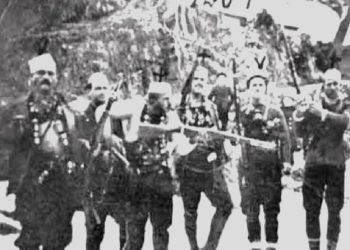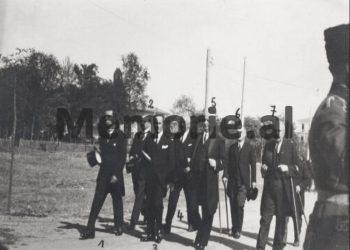By Dashnor Kaloçi
Part twenty-seven
Memorie.al / Exactly 43 years ago, on the morning of December 18, 1981, the Albanian Prime Minister Mehmet Shehu, who had held that position since 1953, was found dead in his bedroom (according to the official version, from a bullet from a pistol) in the villa where he lived with his family, at the entrance of the “Block” of the high leadership of the Albanian Party of Labor, just a few meters from the building of the Central Committee of the Albanian Party of Labor and also from Enver Hoxha’s villa. Although more than four decades have passed since that day, considered one of the most serious and notorious events of that regime, there is still no clear and accurate version regarding what happened to the former Albanian Prime Minister Mehmet Shehu on the night leading to December 18, 1981! However, even after the 1990s, dozens of testimonies and archival documents have been made public regarding that event, “the murder or suicide of Mehmet Shehu,” which continues to be the subject of numerous debates and discussions, even wrapping it further in mystery around the truth.
Based on this fact, in the context of publishing dozens of testimonies and files with archival documents from the secret fund of the former State Security and the Ministry of Internal Affairs, or the Central Committee of the Albanian Party of Labor, which we have published over the decades since the collapse of Enver Hoxha’s communist regime and his successor, Ramiz Alia, Memorie.al has secured the voluminous file “of the enemy Mehmet Shehu,” which has been extracted from the secret fund of the former State Security at the Ministry of Internal Affairs (now part of the fund of the Authority for Information on the Documents of the former State Security), where, with a few minor exceptions, most of them have never seen the light of publication and are made public for the first time in full.
In the mentioned file, there are the relevant facsimiles, the expert report of the investigative-operational group that was set up immediately on the morning of December 18, 1981, led by Koço Josifi (head of the Investigative Directorate of the Ministry of Internal Affairs of Tirana), the forensic doctors Dr. Fatos Hartito and Docent Bashkim Çuberi, the prime minister’s doctors, Milto Kostaqi and Llesh Rroku, as well as the criminalist expert from the Central Criminalistic Laboratory of the Ministry of Internal Affairs, Estref Myftari, assisted by high officials of that ministry, Xhule Çiraku, Elham Gjika, and Lahedin Bardhi.
Also, in the voluminous file that we are making public, there are testimonies from the family members of former Prime Minister Mehmet Shehu, from the service personnel, and his escort group, as well as from all other individuals who were summoned and testified about that event. Moreover, the documents in question, which we are publishing along with the facsimiles and relevant photos, provide more information regarding this matter.
However, even though we are dealing only with archival documents, it should be emphasized that; knowing how that system operated before the ’90s, we cannot claim absolute truth regarding what is written there, as not only from the individuals who provided their testimonies, but also from the investigators of this case, it has been made known that the testimonies were obtained under pressure, intimidation, and physical and psychological violence, with some investigators going so far as to write them themselves while the witnesses or defendants merely signed them.
Continued from the previous issue
MINUTES OF THE INTERROGATION OF PERLAT ALI ÇAUSHI, DIRECTOR OF THE DEPARTMENT OF FOREIGN INTELLIGENCE AT THE MINISTRY OF FOREIGN AFFAIRS, BY THE INVESTIGATOR OF THE MINISTRY OF INTERNAL AFFAIRS, PERLAT KASAJ
MINUTES OF THE INTERROGATION
(Of the witness)
Today, on 21.6.1983, in Tirana.
I, the investigator of the Ministry of Internal Affairs, Perlat Kasaj, take the testimony as a witness in the investigation:
Name, father’s name, surname: Perlat Ali Çaushi.
Date of Birth: (day month, year), 23.4.1935.
Education: Higher.
Place of residence: L.8, Rruga “Dora D’istria”, Pallati 12/1, Shk 3/24 Tirana.
Position: Officer in the Ministry of Internal Affairs.
Party Membership: Member of the P.P.SH.
Has he been convicted: Not convicted.
ID number: EV Nr.219215.
Relationship with the defendant: No relation.
The investigator warned me about criminal responsibility, pursuant to Article 202 of the Penal Code, for false testimony.
WITNESS SIGNATURE
Perlat Çaushi
Regarding the case, I can tell you as follows:
Since 1955 to the present, I have worked in the State Security bodies in various positions. Here, I also came to know the enemies of the Party, Kadri Hazbiu and Feçor Shehu. I have had no familiarity with them, apart from official relations.
From 1980 until January 1982, I was under the direct subordination of the enemy Feçor Shehu, in the position of Director of the Department of Intelligence. To highlight these enemies of the Party, I note the following moments:
The enemy Feçor Shehu greatly exaggerated the value that the enemy Mehmet Shehu gave to the activities of the Intelligence bodies, considering it “30 years behind” and that “he has not created his personality as an intelligence cadre.”
Was this assessment from the enemy Feçor Shehu meant to plant doubt in the ears of the enemy Mehmet Shehu, as a tool to deny the long-standing work of Intelligence, or was this assessment made by Mehmet Shehu himself? This is unknown. However, this satisfactory assessment pleased both enemies.
The 30-year period coincided with the time when Mehmet Shehu left the Ministry of the Interior, while Feçor Shehu had only been in charge of the Intelligence for a year. It is understood that such an assessment (including the evaluation Mehmet Shehu made of the work of the State Security bodies at the seminar in 1980), negated the work of the Party and Comrade Enver in these bodies.
As far as I can judge today, Feçor Shehu’s goal was to ensure that every normative act bore his signature, even if there was no essential change, thus creating the impression that the foundation of norms in Intelligence was established with his arrival.
Thus, the regulations for operational-agent registration and their competencies were revised. For now, I can say that he had tendencies to equate the work of Intelligence with Counterintelligence. We proposed changes to several paragraphs of this regulation.
The attempts of the enemy Feçor Shehu to alter some previously given orientations for operational-agent work aimed at better processing the UDB (State Security) bodies, our objective has been to engage in cooperation also with UDB members of Albanian nationality who had a good standing.
Feçor Shehu tried to make us abandon all issues of this nature. Whenever proposals arose in this area, he refused to listen. In our intelligence network, we also have some key individuals from reactionary organizations and several promising candidates. Feçor Shehu directed that we should not engage with the key figures, or else we would have no one to work with.
For a long time in intelligence, bases have been laid, and several agent groups have been created. Even for this issue, without arguments, Feçor Shehu ordered us to withdraw. When the traitor Mehmet Shehu said that only 20 agents were needed in Intelligence, the enemy Feçor Shehu ordered those exceptions be made within the ranks of the agency.
Deliberately, Feçor Shehu did not believe in the Intelligence agency, even among those collaborators who were proven. For many collaborators, he would give the direction that; “he is a traitor,” “he’s double-faced,” “don’t associate with him,” “exclude him,” etc.
Feçor Shehu obstructed the sending of information to the Party leadership. Despite the numerous pieces of information, we sent him, only a small percentage reached the leadership, and that was mainly sent to the traitor Mehmet Shehu.
Thus, the Party leadership was deprived of many issues related to the hostile activities being developed from outside against our country. He found all sorts of excuses, saying; “this information has no value,” “it was not worked on properly,” “your collaborators are liars,” etc.
Typical are the reports provided by Intelligence about the events in Kosovo, where many of them spoke of an explosive situation. I can say that only the date of the explosion was missing. None of this information reached the leadership.
As for the purpose of not informing the leadership about this significant issue, that is already known, but at that time it didn’t even occur to us that it was being done with hostile intent. Later on, regarding this matter, it was ordered that we conduct a study for the Party leadership about the events that took place in Kosovo.
In the first part of this study, we included data that we had prior to the events. After holding it for several days, Feçor Shehu sent it upstairs and said; “I didn’t read it, file it with the object’s file.” I believe he acted this way because he wanted to prevent it from coming to light that Intelligence had data that he had not timely informed the Party about.
After the announcement of the engagement of the son by the enemy Mehmet Shehu in September 1981, and the breaking off of this engagement, the collaborator “Gruri” urgently requested to come illegally to our country, as he had some very important issues that he could not report abroad.
We proposed to Feçor Shehu that the collaborator be brought to our country, but he did not approve it. I add that after the suicide of Mehmet Shehu, the information regarding this collaborator, as well as the data he provided that; “the Americans are informed on time about what is discussed in the Political Bureau”, Feçor Shehu had given to Elham Gjika, without notifying the Third Directorate or comrade Hekuran Isai during the handover of duties.
The same happened with another collaborator who requested a meeting last year to report some important issues but later withdrew. Only the relevant comrades in the directorate, Feçor Shehu knew about this, and perhaps even the traitor Mehmet Shehu.
For this, I made a special report. On 12.9.1981, I don’t remember if the engagement of Mehmet Shehu’s son had ended, but Feçor Shehu indirectly, through the First Directorate (Kadri Gojashi), withdrew the files of the fugitives Ramazan Turdiu and Arshi Pipa, without telling me directly.
A few days later, after the engagement was broken, while in Feçor’s office for work-related issues, he asked me; “What have you heard about Mehmet Shehu’s children?” I spoke to him about the engagement, saying that it was a hasty step and that the simplest person, in such cases, asks about the biography, and that it was very good that the engagement was broken.
Then I spoke to him about the unbecoming behavior of Mehmet Shehu’s children abroad, such as Bashkimi in Italy, for Skëndër’s companionship with a …, for Marjeta, who has become a distributor of Western fashion in Tirana, etc.
Continuing, in an attempt to find some support for the faults that Feçor had, as the “mediator” of this engagement, he asked me; “What do you think, Perlat, am I wrong in this matter?” I told him that; “I am not in a position to judge you, as I know nothing, and even the files of Ramazan Turdiu and Arshi Pipa, I am now realizing were for this issue.”
“Well, – Feçor Shehu continued, – comrade Mehmet asked me for Silva’s biography and I gave it to him.” I told him that; “if you learned that the engagement would be announced, knowing the girl’s biography, you should have informed comrade Enver.” “Precisely, – he concluded, – here is my mistake!” Around August-September of 1982, I was tasked by the leadership of the Ministry to study several documents in the archive of the Ministry of Internal Affairs.
In the documents I studied, I found a letter signed by the enemy Mehmet Shehu, which (I don’t remember exactly), he addressed to the prime ministers and internal ministers of the Warsaw Pact countries, by which he authorized the internal affairs bodies of those countries to take action regarding our agency that was among the Albanian students studying abroad.
As for what actions were taken afterward, I do not know anything. But this must be known by Kadri Hazbiu and Mehmet Shehu, who produced the letter. These things remind me of the activities of these enemies, which as I mentioned at the beginning, could serve to highlight their hostile activities.
After I read the minutes and saw that my statements were written correctly, I signed. Memorie.al
Witness Investigator
Perlat Çaushi Perlat Kasaj
Continued in the next issue




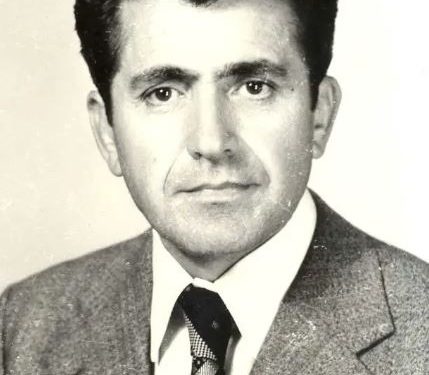
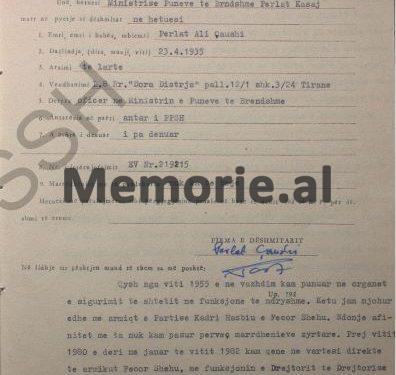
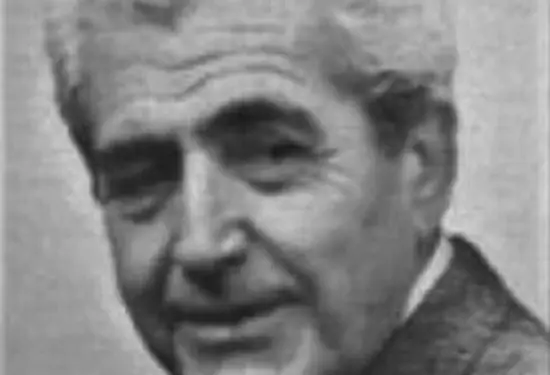
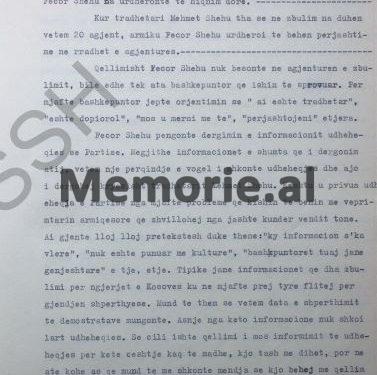
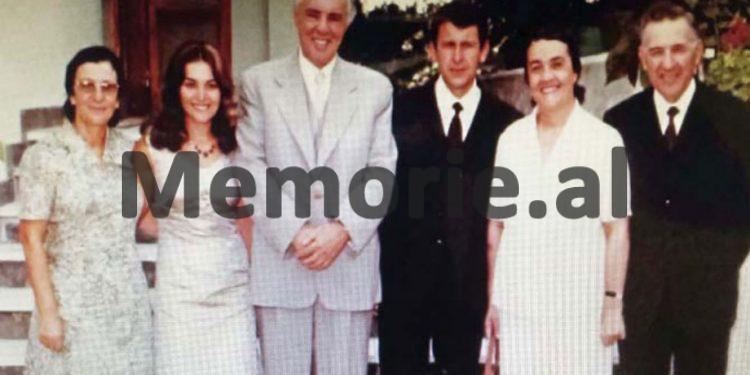
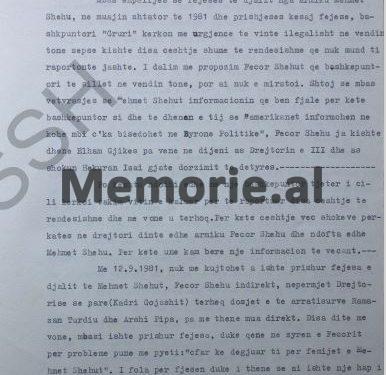
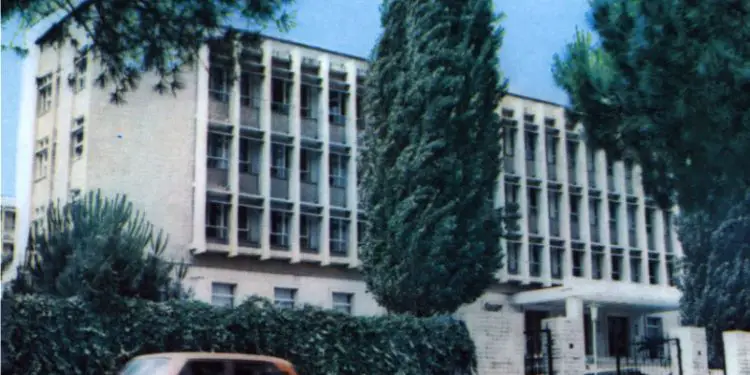
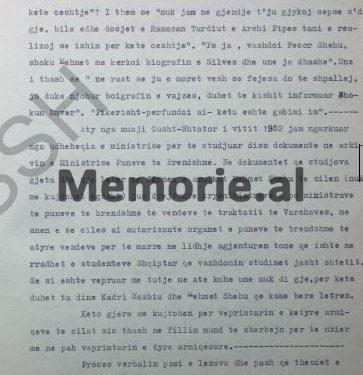
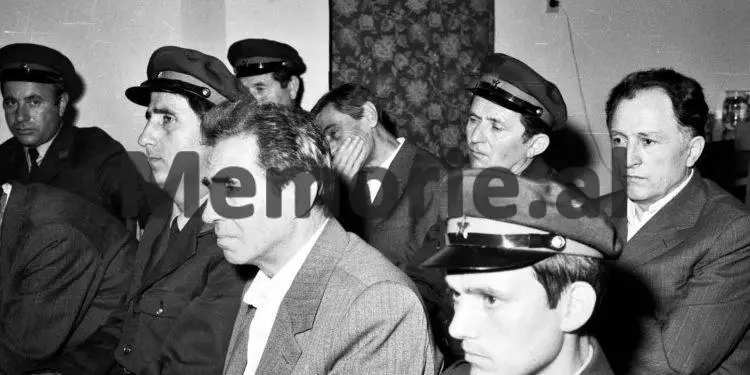
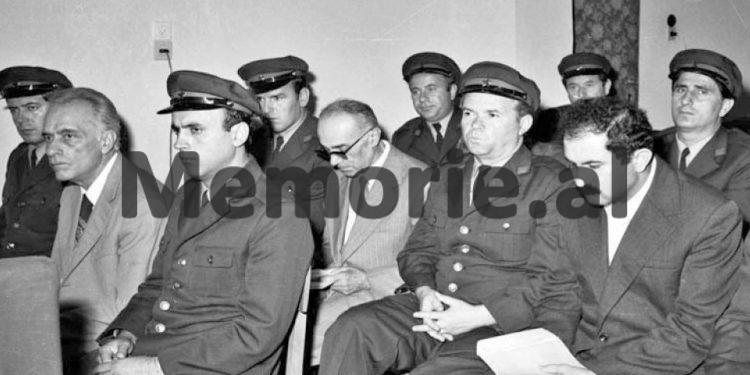
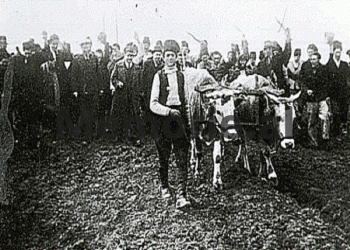
![“They have given her [the permission], but if possible, they should revoke it, as I believe it shouldn’t have been granted. I don’t know what she’s up to now…” / Enver Hoxha’s letter uncovered regarding a martyr’s mother seeking to visit Turkey.](https://memorie.al/wp-content/uploads/2026/01/Dok-1-350x250.jpg)


